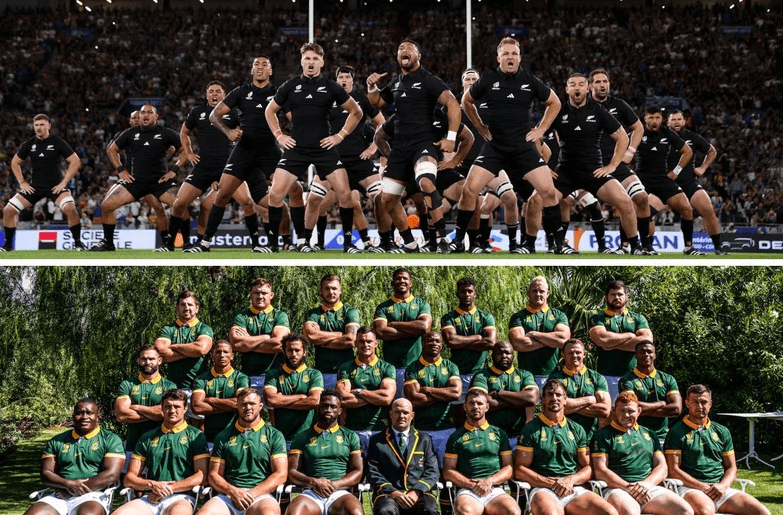
BIG READ: In South Africa some hearts still beat for the All Blacks
A number of South Africans will be cheering on the All Blacks at the 2023 Rugby World Cup, despite the Springboks still in contention.

When New Zealand play Ireland in the Rugby World Cup quarter finals on Saturday, Dylan Moodaley, a 32-year-old South African from Cape Town will don his favourite All Blacks T-shirt and cheer on for his country’s bitter rivals.
So will most of his family – part of a sizeable minority of South Africans who, for a mix of family tradition, sport aesthetics and politics, shun the national team and love the New Zealanders instead.
“There are a few outliers who support France and Australia, but I can’t think of anyone that supports the Springboks,” Moodaley said of his relatives.
All Blacks fandom in South Africa dates back to the anti-apartheid struggle, when the Springboks were seen as a symbol of white rule.
For 90 years Springbok selectors chose only white players, with black and mixed-race athletes, known as coloured under the apartheid system, sequestered in separate leagues with no international participation.
“Support for the All Blacks amongst black and coloured populations was born largely out of the interpretation that a defeat for the Springboks was a defeat for white South Africans and apartheid,” said Sebastian Potgieter, a South African historian and critical sport researcher at the University of Otago in New Zealand.
MUST READ | Jacques Nienaber: FINAL match in charge of the Springboks?
‘GENTLEMEN OF THE SPORT’
Heston Botha, 64, chair of an All Blacks club in East London, fondly remembers when his father took him to watch the New Zealanders in person for the first time in nearby Port Elizabeth, now Gqeberha, in 1970.
As per the segregation rules, their seats were in a designated embankment behind the goal post, away from white supporters.
“It was so full we could not actually sit,” said Botha.
“Ninety-nine percent of the guys there, our people, were All Black supporters.”
That was the first year the All Blacks were able to bring players of Maori or Pacific Island heritage to South Africa as the regime allowed them the label of “honorary whites”.
“For South Africa’s oppressed black and coloured populations, these players represented everything that apartheid denied them,” said Potgieter.
Seeing the likes of Bryan Williams and Sid Going in real life, having previously only heard about them on the radio, was “a turning point” for Botha, making his passion for their black jerseys indelible.
More than five decades on, he still works hard to catch a glimpse of his idols, often trying to book a room in the same hotel as the visiting All Blacks for a chance to meet them at the breakfast buffet.
“They are the gentlemen of the sport,” he said.
ALSO READ: Springbok great Bryan Habana joins 4 legends in World Rugby Hall of Fame
‘GOOSEBUMPS’
Meanwhile, apartheid ended in the early 1990s and the Springboks enjoy a growing popularity.
After years of painfully slow progress in boosting the team’s racial diversity, in 2018 Siya Kolisi became the first black player to wear the armband in a Test match.
A year later, he successfully skippered the Springboks to World Cup glory, helping bring many young, black South Africans closer to the sport.
Inclusivity is now a selling point, with the current team slogan, “stronger together”, following in the footsteps of the “one team, one country” motto of the 1995 side famously celebrated by Nelson Mandela.
Yet changes have not gone deep enough for some.
“The old emblem and the Springbok association is problematic to many of us,” said Philani Nongogo, an All Blacks fan from Pretoria.
Others feel the successful multi-racial line-up belies the deep societal divisions that persist in a country that the World Bank describes as the most unequal in the world.
“I see it as window-dressing for South Africa,” said Botha.
ALSO READ: Springboks have never lost to France at a RWC: Check the record
Moodaley, who belongs to a younger generation that grew up in a democratic South Africa, is aware of the politics but says his passion is a family thing.
His first memory of the oval ball is watching with his father the 1995 World Cup, when All Blacks legend Jonah Lomu “set the world alight”.
The simple pleasure of supporting one of the most dominant and iconic teams in world rugby followed.
“There’s so much to love about them in terms of the history, the culture, the style,” said the environmental consultant.
“I just don’t feel drawn the same way to the Springboks,” he said.
“They just don’t give me goosebumps”.
By Garrin Lambley © Agence France-Presse